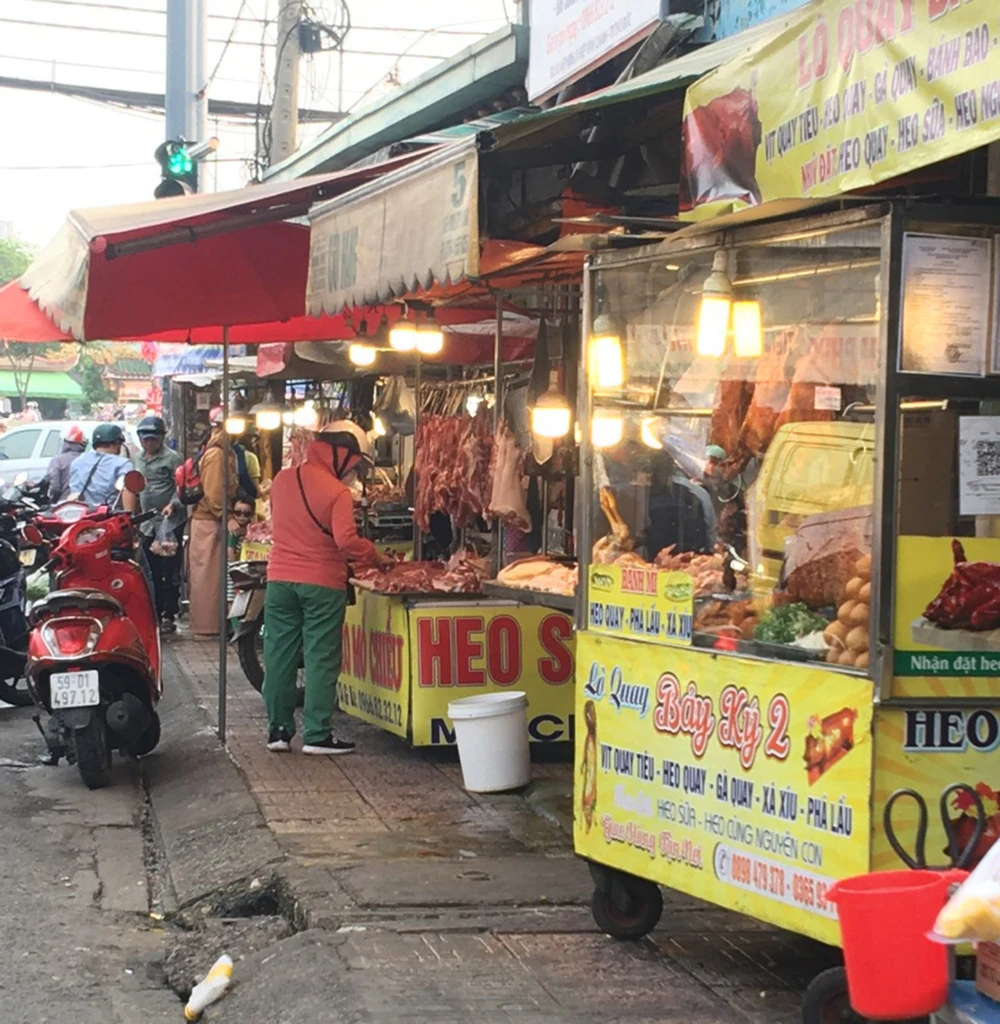
Hard habits to break
In the days before Tet, the demand for buying and selling goods increased, so many spontaneous markets appeared on the roadside, sidewalks, vacant lots in front of factory gates, etc. People and workers like to go to spontaneous markets because they are convenient, cheap, and can stop by the roadside to buy goods. However, the worrying thing is that the quality of goods, especially fresh food, is not guaranteed to be hygienic.
For many weeks now, Duong Quang Ham Street (Ward 5, 7, Go Vap District, Ho Chi Minh City) has been covered in dust and dirt due to people demolishing houses to widen the road, but the spontaneous market on Duong Quang Ham Street (near the intersection of Duong Quang Ham and Nguyen Thai Son) is still open. In the afternoon, stalls selling vegetables, pork, and fresh fish are bustling with buyers and sellers. The women selling vegetables and fruits occasionally spray water to wash away the dust, keeping the vegetables green. Pork is dried in the dusty sun, and sellers occasionally wave fans to chase away flies. Shoppers stop their vehicles at will, pulling in to buy meat and vegetables.
As the afternoon wore on, the spontaneous market on Nguyen Xi Street (Ward 13, Binh Thanh District, Ho Chi Minh City) became more crowded. Some vendors selling vegetables, pork, and goat meat stood out on the street, inviting passersby to buy their goods. Ms. Nguyen Thi Bich, who lives in Binh Hoa Residential Area, shared that she knew that pork sold on the sidewalk was not hygienic, but she was used to buying it here. On the way home from work, she only had to stop her car for a few minutes to buy enough meat, fish, vegetables, and fruits for her family. Many shoppers said that there was also a convenience store on the street, but because they were afraid to park their cars, they rarely went there to buy. Goods at the market were cheaper than those at convenience stores, even for 5,000-10,000 VND.
In the suburban areas, where many workers live such as Truong Thanh, Linh Trung, Hiep Binh Chanh wards (Thu Duc City, Ho Chi Minh City), spontaneous markets are more crowded, with more buyers and sellers. The spontaneous market on Hiep Binh Street, Hiep Binh Chanh Ward, stretches for hundreds of meters, with hundreds of large and small stalls. Goods in the spontaneous market not only include vegetables, fruits, meat and fish, but many places also sell live chickens and ducks.
Mr. Nguyen Van Phuc (living on Tam Phu Street, Hiep Binh Phuoc Ward, Thu Duc City, a regular customer of the spontaneous market) shared that his family likes to shop at the spontaneous market on Hiep Binh Street because they can personally choose the chickens and ducks they like. Buyers only have to wait 5-7 minutes to get fresh chickens and ducks to take home. During the bird flu epidemic, even though the government banned the sale, they could still buy live chickens and ducks at the market.
Difficult to manage food hygiene and safety
According to Circular 10/2023 of the Ministry of Health on regulations on food safety inspection activities in food production and trading, the People's Committees of wards and communes; and health stations of wards and communes are responsible for food safety inspection in the area. In fact, the inspection and supervision of food hygiene and safety quality at spontaneous markets still faces many difficulties.
Mr. Nguyen Trung Kien, Vice Chairman of Ward 5 People's Committee (Go Vap District, Ho Chi Minh City), admitted that ensuring hygiene and food safety for spontaneous markets and street vendors is a difficult task in the locality. According to regulations, to be allowed to sell fresh products, pork stall owners must meet the conditions of meat being packaged and kept in the refrigerator...
In fact, just looking at it with the naked eye, we can see that the pork selling points in the spontaneous market do not meet the requirements. Because of the people's consumption needs, the ward cannot close the spontaneous market and not allow pork to be sold. The measure the ward applies is to regularly check, require sellers to comply with regulations and punish buyers who stand in the middle of the road, obstructing traffic, in order to gradually change people's habits and eventually eliminate the spontaneous market.
Ms. Le Hong Tham, Vice Chairman of Ward 13 People's Committee (Binh Thanh District, Ho Chi Minh City), informed that in order to control hygiene and food safety, the ward encourages people to register their business households and write a commitment to sell products with clear origin and correct weight. However, some businesses, in pursuit of profit, have sourced pork floating on the market. Through inspection, the ward discovered twice that the stall owner was selling pork of unknown origin, made a record and handled it strictly.
Officials in many wards and communes said that in order to avoid inspection by authorities, many businesses have left spontaneous markets and switched to mobile sales. Vendors have converted motorbikes, small trucks and cars to serve as sales points, with everything from vegetables and fruits to fish, meat and live chicken and duck. The sales vehicles often enter residential areas, stopping at factory and enterprise gates during rush hour. Whenever they see authorities appear, they drive to another location. The quality of goods and food sold by these vehicles is not controlled.
HOANG VAN
Source








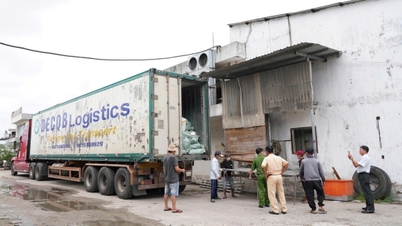


























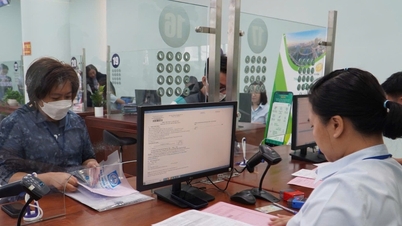










































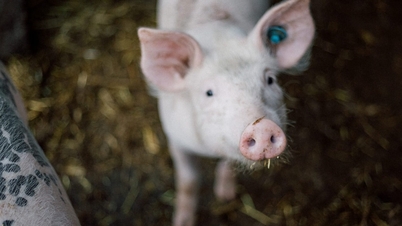

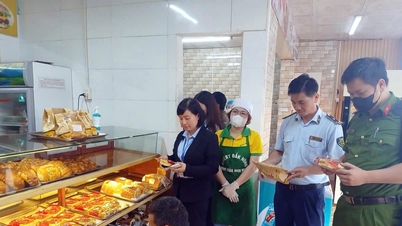





















Comment (0)